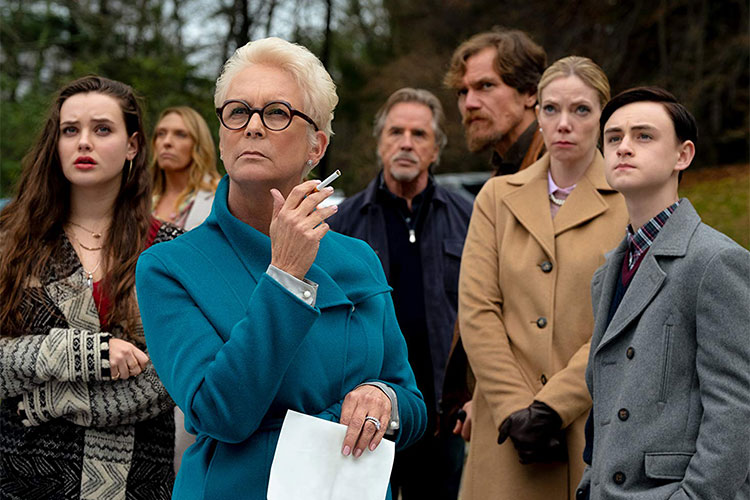Can you talk about writing this film and bringing these characters to life?
Rian Johnson: It all started with me loving Agatha Christie growing up. I always wanted to do a “who done it.” I thought it would be really interesting; I’m a “who done it” junkie. I watch all of them that come out. I love them all. Usually when you see them today, they’re period pieces, because they’re usually Christie adaptations. The idea of doing a “who done it” set in America in 2019, and really using that to plug into America in 2019 and to draw the characters the way Christie drew the characters from British society when she was writing, to draw that out of today and right now, seemed really interesting. Tonally, you need really good actors to ride that line of going as big as we did with this movie and still having it feel grounded to work as a movie and not tip over into parody. That’s why you hire the best actors on the planet and then it all sorts itself out.
make it feel like a roller coaster ride and not a crossword puzzle
Don, can you talk about the characters and how all of their misanthropy is tempered by some sort of internal pain?
Don Johnson: Well all of them except for my character, who does nothing happily. He’s kind of the personification of the entitled family vibe. It was fun for me to do, because I have never played a character like that before, I loved how obsequious he was and how deferential he was to Jamie Lee’s character. It was fun.
Daniel, can you talk about your character and the way he carries himself and his accent?
Daniel Craig: I was just lucky to get a script that was as richly and as well drawn out as this one. I read it and I saw it. I think it has a lot to do with Rian and I sharing a love for “who done it” films. I grew up watching the same movies as he did and watched them religiously over and over again. I kind of understood the language that Rian was using. So we looked it up and it was a gentle southern language. I inhabited the character immediately in one reading, I talked about this the other day, about as actors and how arrogant we are, we go and change this and that during our first read-through, as though we know for sure… but that did not happen when I read this script. I just read it and said to myself, “I know who this is.” I want to play it. I sort of then picked a few people, Tennesse Williams, his voice has a high pitched accent and was not very suited. Then I landed on Shelby Foote, the historian, who has this beautiful Mississippi rolling accent. He speaks slowly, but has this incredible speed of thought. He talks about things with authority and I nailed it with a great accent coach. We sat for a few hours a day for months on end. Then when we got to set, and Jenny our costume designer, whom I’ve worked with before and is great to work with, gave me the physical material and we paired the two together.
Did you have to change anything in the language so that the characters and the house functioned in the plot together?
RJ: These guys clicked into it really easily. The only thing we would adjust on set were expository scenes. I wanted to be really tuned in if the actors could not follow the through line of what was happening in any given scene. I wanted to make sure every scene was clear to everybody, because I figured if it was clear to you guys then it would be clear to the audience. That’s where ninety percent of the work on a script like this goes into is making it feel easy for the audience, making it feel like a roller coaster ride and not a crossword puzzle at the end of the day. That was the main way we did tweaks on set.
Knowing that you’re in a “Who Done It,” do you play up to that and twirl your spiritual mustache a bit?
Jamie Lee Curtis: When I first had a phone call with Rian, the only questions I had were about tone. I had done a few different types of things, I just wanted to know where he was on the scale of tone. Because it does not matter where he is. I’ll go to whatever place he wanted. He said he wanted it to be heightened reality. Very much real, but with a slight accent of heightened reality. For me as an actor, the only question is how to tell the truth. It doesn’t matter to me, I don’t care what it is. Also I’m just like Don, I’m not a fan of the genre, I don’t care about the genre, I don’t watch those movies. There are other movies that I enjoy very much, but I’m not a particular fan of this genre, but it doesn’t matter. That is the beauty of this collaborative medium. It doesn’t matter if I’m a fan or not. As an actor, it’s simply my job to tell the truth. If you’re telling the truth through Linda’s point of view, she’s in grief. She loved her father. I think she may be the only one in the family who really loved him and she lost him. That was my truth, and the rest of it was just dross as we say. It was just hilarious.

